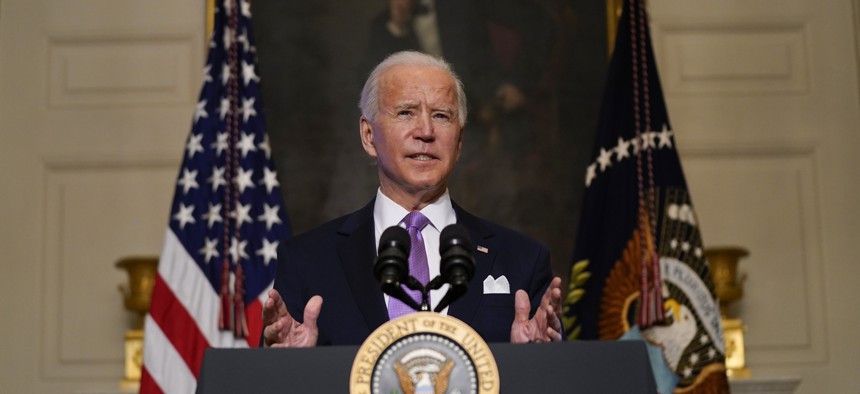Biden Announces Covid Vaccine Surge to States

resident Joe Biden delivers remarks on COVID-19, in the State Dining Room of the White House, Tuesday, Jan. 26, 2021, in Washington. AP Photo/Evan Vucci
States will see more doses of the vaccine beginning next week and greater transparency about future shipments under the administration’s plan.
The federal government will send states at least 1.4 million more coronavirus vaccine doses a week and provide better estimates of how many doses they should expect going forward, President Biden announced Tuesday as he detailed efforts meant to improve the country’s pandemic response.
Beginning next week, states will see a 16% increase in the number of vaccine doses the federal government distributes, from 8.6 million doses to 10 million doses a week, Biden said. The administration also plans to provide states with three-week estimates detailing the number of vaccines in the pipeline in order to help local health officials prepare and ensure they have the resources in place to administer the shots. Currently, states are only told how many doses to expect each week.
“This is going to help make sure governors, mayors and local leaders have greater certainty around supply so they can carry out their plans to vaccinate as many people as possible,” Biden said during an announcement Tuesday at the White House.
To further boost vaccine distribution, Biden also said his administration is working to procure another 100 million doses each from drugmakers Pfizer and Moderna. The additional 200 million doses, combined with previous purchases, would position the United States to be able to fully vaccinate 300 million Americans by the end of this summer.
Governors and public health officials have complained about vaccine shortages and the lack of reliable vaccine shipment data. While some acknowledged that the Biden administration’s boost in shipments would still not adequately cover the current need for vaccines, they lauded the action as a step in the right direction.
Minnesota Gov. Tim Walz said the Biden administration’s plan would increase the number of vaccines the state received by 11,000 doses. This week, the state received 70,000 doses, which are being prioritized for healthcare workers, nursing home residents and people over the age of 65.
“The fact is, we still need more doses,” Walz said, calling Tuesday’s announcement a good first step. “We have seen extraordinary demand for the vaccine in Minnesota, and we are working with a variety of providers to create a strong network of choices for Minnesotans when it’s time to get their vaccine.”
Several states have stood up large-scale vaccination sites in anticipation of vaccinating millions of Americans as they prepare to make the vaccine available to more people. But shortages, long lines at distribution sites, and difficulties making vaccine appointments have hampered the rollout in states across the country.
“We've been going week to week and you really can't plan and schedule when you don't know what you're going to get next week,” said New York Gov. Andrew Cuomo, describing the planning difficulties states have faced. “You can't do it in any orderly way, so knowing what number we're going to get for the next three weeks is very important.”
As of Tuesday, data from the Centers for Disease Control and Prevention indicates that 44.3 million doses of the vaccine have been distributed to states and 23.5 million doses have been administered.
Earlier this month, when President Trump was still in office, a coalition of nine governors wrote to the administration asking officials to release millions of doses that were being held in reserve to provide second doses of the vaccine to people who have received their first shot. The Trump administration had indicated it would release the vaccines, but state officials said they had not yet seen any increased shipments.
Biden was critical of his predecessor’s coronavirus response, noting that when he took office last week, his administration found the vaccine program “in worse shape than we anticipated or expected.” But he said greater cooperation with states would improve the process.
“We now have a national strategy to beat Covid-19,” he said.
Andrea Noble is a staff correspondent with Route Fifty.
NEXT STORY: 'We Can't Have Different Facts': Why Lt. Gov. John Fetterman Still Believes in Universal Truths





